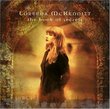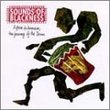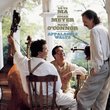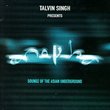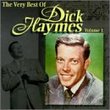| All Artists: Wendy Wasserstein Title: Dvorak: Symphony no 9 / Kertsz, London Symphony Orchestra (Penguin Music Classics Series) Members Wishing: 0 Total Copies: 0 Label: Decca Release Date: 9/29/1998 Genre: Classical Style: Symphonies Number of Discs: 1 SwapaCD Credits: 1 UPC: 028946060421 |
Search - Wendy Wasserstein :: Dvorak: Symphony no 9 / Kertsz, London Symphony Orchestra (Penguin Music Classics Series)
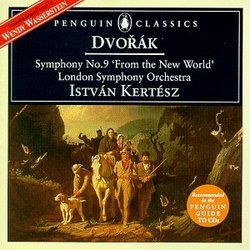 | Wendy Wasserstein Dvorak: Symphony no 9 / Kertsz, London Symphony Orchestra (Penguin Music Classics Series) Genre: Classical
This entry in the new Penguin Music Classics collection presents one of the best readings of Dvorák's Ninth, From the New World. In her liner essay, playwright Wendy Wasserstein--author of the acclaimed Heidi Chronicl... more » |
Larger Image |
CD DetailsSynopsis
Amazon.com essential recording This entry in the new Penguin Music Classics collection presents one of the best readings of Dvorák's Ninth, From the New World. In her liner essay, playwright Wendy Wasserstein--author of the acclaimed Heidi Chronicles--describes playing the Ninth at blaring volumes on her discman as she traversed downtown Prague. And this is exactly how the music should be heard: loud. Dvorák's Ninth is, of course, so frequently played that it can become cumbersome, but Istvan Kertész and the London Symphony Orchestra play the score wonderfully, tender in the Largo and pouncing in the Molto vivace. This performance gives off pristine string and brass architectural detail even as the Ninth swoons in romantic washes and blasts in robust high energy. And there are few crescendos as brilliant as the Allegro section, with the brass crying out as if from the precipice between Dvorák's centuries-old Prague and the young, multiracial United States. Much has been made of the presence of Native American and African-American strains in this piece, and these elements make it one of the 19th century's acknowledged gems. The Ninth was a huge splash for Dvorák when he unloosed it in 1893 at Carnegie. Wasserstein relates how it invigorated her as a high school student in 1966, and it still electrifies listeners in 1998. --Andrew Bartlett Similarly Requested CDs
|
CD ReviewsTop of the line. Michael Newberry | Santa Monica | 02/17/2001 (5 out of 5 stars) "In an early review, Songs of the Auvergne, I commented that there were some pieces of music like Dvorak's 9th that I loved but I couldn't find the right performance. Recently I heard samples of this recording on Amazon. Based on those samples I got it. It is a marvel. Though it is a 1966 recording the sound is superb and it feels virtually live. The conducting of Istvan Kertesz is more tender than sentimental, more clean than lush, more brilliant than loud, and the pacing is more like advancing rapids than like a driven war-horse. The strings are right on, the brass are virtuosic, and the drama resplendent. A tour de force. I prefer this CD well above the Karajan, Masur, and Solti versions.The Othello and Carnival overtures are also well played. The jacket cover has an irrelevant and insipid essay by a writer; I guess Penguin is using the space to promote its library of literature." Fair, but Decca should re-issue the finest "New World" ! Jeffrey Lee | Asheville area, NC USA | 07/11/2002 (3 out of 5 stars) "This is the second rendering of Dvorak's Ninth by Kertesz. The first was recorded close to 1960 on the same London/Decca label with the Vienna Philharmonic. I wish I could feel as exuberant about recommending this more recent London Symphony version; however, while the playing is competent, the interpretation is missing those attributes that made the earlier Vienna version so non-pareil. For starters, one reviewer hits it right on the nose---this London Symphony account "seems flat", that is, in comparison to the Vienna, which serves up in spades an aura of poetic nostalgia, panoramic vistas and sweeping dynamics. And the recorded sound is absolutely wonderful. I've heard a lot of "New Worlds", but the Kertesz/Vienna Philharmonic matches, for me, the ideal of what this work should sound like. Why Decca has not reissued it in its Legendary Performances series, I don't know. If and when they do, get it immediately, and you will see/hear what I mean. However, in the absence of the Kertesz/Vienna version, I would go with the sensitive Walter/Columbia Symphony performance." A great way to get started with classical music Mark R. De Guire | Cleveland Heights, Ohio | 06/06/2000 (5 out of 5 stars) "As a kid, I enjoyed "programatic" classical music -- ballets, tone poems -- and shorter pieces like marches and waltzes. The "New World" Symphony was the first extended piece of "pure" music that I ever loved: vigorous, tender, exciting, heartbreaking. Not only is it full of memorable themes, but it's a fine way to learn about some of the structures that composers of program-less music used to express their ideas. The first movement is a textbook specimen of the sonata-allegro form, and the symphony overall is a great example of the cyclic form used so often in late 19th-century symphonies. In short, I recommend this work to anyone who's ready to go beyond the Suites and the Highlights collections. I have treasured this particular recording for 20 years as an LP, and it's great to have it on CD. To top it off, the "Carnival" Overture is simply thrilling, and Othello is dark and dramatic, and the disk is mid-priced. You can't go wrong!"
|

 Track Listings (6) - Disc #1
Track Listings (6) - Disc #1